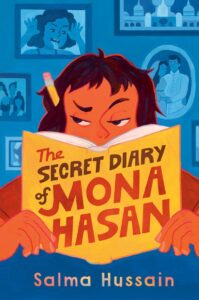Reviewed by Paige Pagan
Review Source: Teaching for Change
Book Author: Salma Hussain
Written in the tradition of The Diary of Anne Frank and The Diary of Adrian Mole, Aged 13 ¾, this insightful middle grade novel teases out serious themes such as war and politics, immigration and racism, classism and labor, genderism, and more through the lens of an 11-year-old’s early understanding of them, making for both an accessible and humorous read. Set in the early 90s and spanning across three countries — the United Arab Emirates (UAE), Pakistan, and Canada — this novel is at turns nostalgic and relevant to current events. Hussain expertly conveys the daily plight of a tween girl coming into selfhood and consciousness against the backdrop of the Gulf War and amidst the grand sweep of history.
Readers follow a year in the life of precocious Mona Hasan, born and raised in Dubai. Mona lives a privileged life afforded by her father, who works in a prominent bank, and grounded by her stay-at-home mother. Mona ruminates on problematic gender standards, such as the only available occupation to women in the UAE being an educator, and she disregards chides rooted in colorism from those in her community over her darker complexion. However, she focuses even more on bigger concerns, such as finding out if Waleed has a crush on her and methods to help her flat chest grow. But the adults’ heated conversations and the subjective news coverage of the encroaching war become difficult to ignore. Mona says, “All this time, I had thought wars happened in far-off places to far-off people, and now I know the truth is that they can happen to anyone!” (p. 30)
When Mona’s parents give up everything and seek refuge in Canada, it’s the trip to Islamabad before the big move that opens up Mona’s worldview, contextualizing the concept of war as she learns about her family’s experience of living through both the Indian Partition and the Bangladesh Liberation War. Conversely, at her school in Halifax, Mona wonders why they only learn about wars of the past when wars are also happening in the present day.
School continually gets worse as Mona faces both covert and overt racism — she’s accused of plagiarism, despite her mother language being English, and she’s targeted as a hijabi. As Mona assumes the weight of becoming her parents’ seemingly sole means to social mobility, she realizes that true heroism lies in the ability to question the world around her and actively works towards creating a better one.
Hussain shows, via the protagonist’s profound maturation over the course of the novel, that young people have the capacity to understand complex global issues and use their voices to make a difference, striving for social change. The same questions that Mona raises in 1991 about freedom and justice are the same pressing questions that remain today — how can war be so real for some and invisible to others? Why are some people denied the basic human rights inherent to others? When will people in power put an end to the cyclical nature of devastating history that only negatively impacts the powerless?
The Secret Diary of Mona Hasan is a text that can be integrated in both history and English curriculums and used in a political unit on the importance of studying current events.
Paige Pagan is a Social Justice Books program specialist at Teaching for Change.
Find more recommended books on this topic on our War / Anti-War and Muslim booklists.

The Secret Diary of Mona Hasan by Salma Hussain
Published by Tundra on May 3, 2022
Genres: Arabic, Muslim, War
Pages: 296
Reading Level: Grades 6-8
ISBN: 9780735271494
Review Source: Teaching for Change
Publisher's Synopsis: Mona learns to find her voice over the course of a year that sees her immigrating from Dubai to Canada in this novel for fans of Front Desk by Kelly Yang.
Mona Hasan is a young Muslim girl growing up in Dubai, United Arab Emirates, when the first Gulf War breaks out in 1991. The war isn’t what she expects — “We didn’t even get any days off school! Just my luck” — especially when the ground offensive is over so quickly and her family peels the masking tape off their windows. Her parents, however, fear there is no peace in the region, and it sparks a major change in their lives.
Over the course of one year, Mona falls in love, speaks up to protect her younger sister, loses her best friend to the new girl at school, has summer adventures with her cousins in Pakistan, immigrates to Canada, and pursues her ambition to be a feminist and a poet.

Leave a Reply